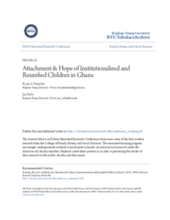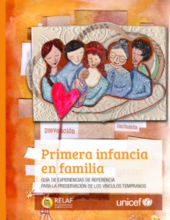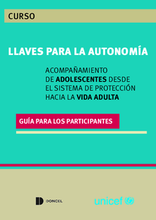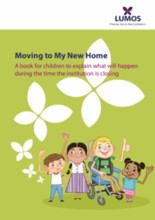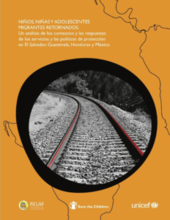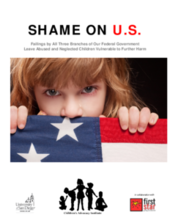Displaying 851 - 860 of 991
This poster provides a brief overview of research conducted in Ghana to examine how institutionalized children’s hope for the future may be impacted by perceived social attachments.
In this article, the author, David Graham, draws comparisons between the experiences and needs of youth transitioning out of care in the UK and those of individuals who are formerly incarcerated reintegrating into society.
This report aims to provide the basis for an agenda to improve university attendance among care leavers in Australia by highlighting the nature and extent of the problem, and suggesting practical solutions within both the education and community service sectors.
This study examines the sources and kinds of support as well as the barriers to social support for a group of care leavers from a children's village in Ghana.
Esta Guía reúne una serie de programas, prácticas y políticas públicas que resultaron en la garantía del derecho a la convivencia familiar y comunitaria de niñas y niños en su primera infancia. En particular, se caracterizan por ser innovadoras o por haber obtenido buenos resultados en la protección y la restitución de este derecho. Las experiencias recopiladas abarcan programas, proyectos e iniciativas públicas, privadas o mixtas de fortalecimiento familiar, provisión de cuidados alternativos, y de reintegración familiar.
El presente curso surge del Acuerdo de Cooperación suscripto en 2014 entre UNICEF Argentina y la Asociación civil por los derechos de niños niñas adolescentes y jóvenes Doncel que tiene por objetivo principal contribuir a desarrollar un modelo de acompañamiento integral para adolescentes residentes en los hogares asistenciales de las provincias argentinas de Misiones, Jujuy, Chaco, Santa Fe y Tucumán en transición del sistema de protección hacia la autonomía y la vida adulta.
The aim of this book is to explain to children what to expect during the time the institution in which they reside is closing.
This paper calls for creative pathways of engagement that delineate places of belonging for and with Indigenous youth in care.
Esta evaluación rápida busca cubrir la escasez de información sobre las políticas y los servicios de las entidades gubernamentales y no gubernamentales encargadas de la protección de los derechos de niños, niñas y adolescentes migrantes retornados a sus sociedades de origen en los países del Triángulo del Norte y México, con un foco en las acciones tendientes a restituir el derecho a la convivencia familiar y la integración comunitaria.
This study, produced by the Children’s Advocacy Institute at the San Diego School of Law, examines the activities of the federal government of the United States in regards to enacting and enforcing child welfare laws and ensuring that individual states are complying with minimum federal standards for child protection.

